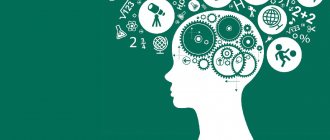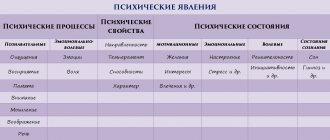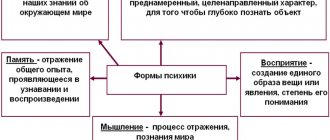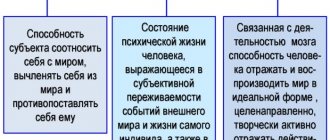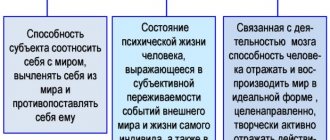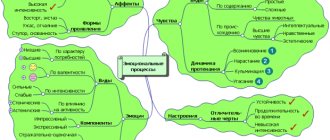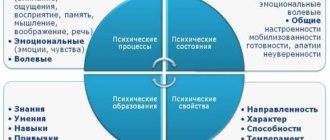General ideas about the psyche
The psyche is a multifaceted construct that determines a person’s personality. There are several links in it:
- Mental processes. These are dynamic indicators that are criteria for understanding the world, help to take and analyze information from everything that surrounds a person, form his emotions in a specific episode of life, his behavior, goals and motives, and also regulate communication, depending on the situation, changing gestures and posture, volume and tone of voice, facial expressions. In the process of personality development, they constantly vary.
- Mental properties. Properties include:
- temperament, which is established at birth;
- character, which, when studying personality, also turned out to be largely dependent on the hereditary factor and only 10% on the external one;
- abilities that are both inherent in nature and formed during the development of the individual.
Properties are a static concept, but are subject to relative variation when exposed to a prolonged irritating factor.
- Mental states. Determines exactly which processes and properties of a person will manifest themselves in a given situation and which of them will prevail over others.
Focus
Perhaps one of the main psychological properties of a person is direction. It includes such important components as:
- Needs
- Motives
- Goals
In fact, direction is nothing more than their unity, which determines the nature of the individual’s activity.
In turn, needs represent the need of a person - if we consider it from the point of view of a socio-biological being in a formed material or spiritual object.
As you know, needs require satisfaction. This is what motivates a person to the necessary activity, which implies a certain activity.
Psychological states as the main criteria for personality research
A person's personality in a particular situation is reflected by the psychological state that shapes its response to a stimulus. That is, some emotions prevail over others, gestures change, behavior changes, sometimes even motivation and other processes. The state is a relatively static indicator, however, with long-term identical stimuli, the time-varying state turns into a practically non-variable property.
In the process of personality research, the following components of the mental state were identified:
- Physiology (physical indicators, for example, pulse);
- Motor functions (facial expressions, speech, etc.);
- Emotions (depending on the situation, both positive and negative);
- Cognitive processes (the ability to adequately think, think through your further actions, analyze the situation);
- Behavior (any actions caused by a specific situation);
- Communication skills (the ability to contact and adequately communicate with a person).
All psychological states are divided into two groups: situational and stable (personal). Each group has its own classification.
Situational states are characterized by instability and the individual’s response to a certain atypical situation. They can be:
- general-functional;
- mental stress;
- conflicting.
Stable, that is, those that persist for a long time, are divided into:
- optimal or crisis;
- various borderline states (dementia, psychopathy);
- disturbances of consciousness.
It is necessary to dwell separately on crisis conditions, which can manifest themselves in the form of:
- negativism (the predominance of negative emotions even under optimal conditions);
- opposition (aggression in certain similar situations or towards certain individuals, but similar by some criterion);
- autism (complete social withdrawal).
Yu. V. Shcherbatykh is the founder of another classification of mental states. The classification is presented in the form of a table and thanks to it you can calculate the formula for a certain state, for example, fear or admiration. The table examines 7 criteria, each of which is divided into transitional and extreme variants of the mental state.
Capabilities
When we are trying to understand why people who are in the same type of life conditions will have different results, to analyze this issue, we will be guided by such a concept as “abilities”, taking as a basis the fact that it is the abilities that will determine what will ultimately be achieved Human.
Mental properties: temperament
As an example, abilities provide an explanation for why some people learn faster than others.
Abilities can be divided into:
- unification of mental processes and states;
- an explanation of how skills, knowledge, skills are acquired, used, and consolidated.
A person has a wide variety of abilities in his arsenal. All of them are divided into several categories.
- Elementary and complex, where:
elementary are associated with the senses and primitive movements. This refers to the ability to distinguish colors, sounds, and smells. They are present from birth.
But not everyone has special abilities, since they require the presence of accompanying inclinations. For example, artistic, visual, musical, acting, etc.
- Theoretical and practical, where:
By theoretical we mean a person’s predisposition to abstract logical thinking. This also includes the ability to set and carry out theoretical tasks.
Regarding practical ones, you probably already guessed it yourself: setting and performing practical tasks that are directly related to specific actions within a certain situation in life.
- Educational and creative, where:
educational ones determine the success of learning, and creative ones suggest how much an individual can create spiritual and material objects of culture. And what is important, he is able to “give out” new ideas, discoveries, etc.
- Communicative and subject-activity, where:
The first, as you yourself understand, means knowledge, skills and abilities that are directly related to interaction with other people and interpersonal communication.
The second refers to the interaction of a person with inanimate objects.
Criteria for a mature personality
Before conducting personality research, you should decide on the criteria that a formed, holistic personality must meet. There is no general approach to this concept, but it is customary to consider the most reliable criteria of V.V. Petukhov, who claims that a person:
- must be capable of creativity;
- can be multiple with simultaneous integrity;
- is constantly evolving.
L. I. Bozhovich approached the question more simply, highlighting only two criteria for an individual: the ability to set priorities, sacrificing one’s “want” for the sake of “need,” as well as the ability to manage one’s actions, setting goals and overcoming obstacles.
Mental properties: motivation
The basis of life and the evolution of all life on earth is motivation. Motive is understood as an urge to act in order to satisfy an urgent need.
Human needs are very diverse. Human needs are divided into two categories:
- material (food, heat, water, air)
- spiritual (communication, activity, knowledge, creativity.
Motives are divided into:
- lower or biological (drives, desires, satisfaction of physical needs)
- higher or social (interests, ideals, beliefs)
Psychological studies of personality
All research methods are divided into 4 categories, united by some common approach to the study of personality.
- Observation. The main ways to assess a personality are through examination, questioning both the person himself and those around him, reading the medical history, if any, reading diaries or autobiographies. The last two sources, as practice shows, are very valuable information.
- Experiment. Includes various studies using equipment. It is also possible to simulate some emergency situations or situations that are important for a particular person to assess his mental state.
- Questionnaires and other similar techniques. They allow you to evaluate many criteria: motivation, focus, self-esteem, willpower, etc.
- Design. Using the techniques of this area, the personality as a whole is determined, without highlighting its individual criteria.
However, in practice all 4 methods are actively used, which can also be mixed, complementing each other, so their separation is conditional.
Mental properties: character
Definition 2
Character is a group of basic personal characteristics; these characteristics control human behavior. A person’s character is manifested in his attitude towards himself, towards other people, towards work, towards things; character also reflects the qualities of a person’s will.
The German psychiatrist and psychologist E. Kretschmer divided personality into two types:
- cyclothymic
- schizothemic
These two types of character are similar to the characters of mentally ill people, but are the norm.
The cyclothymic character is similar to the character of patients with affective disorders, the schizothemic character is similar to the character of patients with schizophrenia.
In psychology, they distinguish such a character property as accentuation; this definition means an extreme degree of the norm, the strengthening of individual traits, which can lead to a personality disorder.
This is interesting
The experimental method is subject to widespread criticism for reasons of humanity, but its results always turn out to be the most reliable and interesting for science. For example, Stanley Schachter conducted a very interesting experiment, during which it was found that in an emergency, life-threatening situation, a person prefers to be not alone, despite the understanding of joint death. Further research showed that a person prefers to be close to someone who experiences the same fears or emotions as him. That is, in a threatening situation, a person needs not just a friend, but a “suffering” friend.
Based on the conducted personality studies, it is possible to reliably determine all the criteria and indicators of a person’s psyche in order to create a holistic personal portrait.
Temperament
Continuing our consideration of the psychological properties of personality, we gradually approached temperament. Temperament conveys the dynamic characteristics of human behavior and activity. According to Pavlov, temperament is nothing more than an innate characteristic of the nervous system. In other words, genotype.
There are four types:
- Cholerics
In short, it is characteristic of those who are hot-tempered, unrestrained, impatient and impulsive. But at the same time, if they are met halfway, they can quickly “stabilize” their condition. They are characterized by persistence and stability in their interests and aspirations.
- Sanguines
It is typical for optimists and jokers. Sanguine people are sociable, which allows them to quickly build bridges of communication with other people. They can work a lot and for a long time. They take on new things easily.
- Phlegmatic people
It is quite difficult for them to rebuild in a new way and adapt to a new environment. They find it difficult to break old habits. They are slowly excitable, but at the same time they need a lot of time to “cool down”. With everything, phlegmatic people are quite energetic and efficient. They are characterized by endurance and self-control.
- Melancholic people
These are gloomy people with permanent internal tension. Their distinctive features: vulnerability, anxiety, restraint. Even minor difficulties can pull the rug out from under their feet, and they immediately give up.
